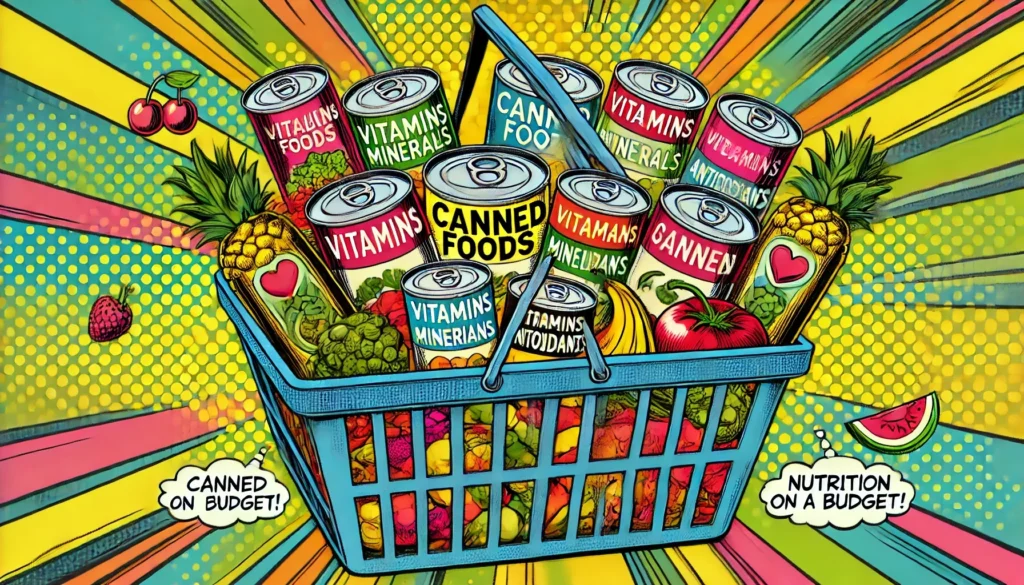
Want to listen instead?
🥫 Canned Foods: Your Key to Healthy Eating Without Breaking the Bank🌿
- In today’s fast-paced world, finding convenient and healthy food options can be a challenge. Enter canned foods—often overlooked as a nutritional powerhouse but offering a range of health benefits at an affordable price. While fresh produce is always encouraged, the reality for many is that time, access, and affordability can make canned foods a more practical choice.
- Mindful Diabetes Inc., through its Pathways to Wellness series, aims to highlight how to make healthy choices even with packaged goods like canned foods. In this post, we will explore the nutritional science behind canned products, discuss their affordability benefits, and provide expert tips on how to select the healthiest options.
The Nutritional Benefits of Canned Foods
- Canned foods often get a bad rap, but science shows that they can provide essential nutrients when chosen wisely. Let’s look at some of their key benefits:
1. Retaining Nutrients Through Preservation
Canned foods can actually retain many of their original nutrients, sometimes even better than fresh options.
- The canning process involves heating, which kills harmful bacteria and helps preserve the food.
- Nutrients like fiber, protein, and certain vitamins (A, D, and B) are largely unaffected by this process.
- In some cases, the heating process even boosts antioxidant levels, such as lycopene in tomatoes.
2. High in Essential Micronutrients
Canned vegetables and beans are rich in vitamins and minerals necessary for good health.
- Vegetables like spinach, beets, and pumpkin are excellent sources of potassium, a mineral key for managing blood pressure.
- Canned fish, such as sardines and salmon, contain omega-3 fatty acids, which promote heart health and reduce inflammation.
3. Longer Shelf Life Without Additives
Unlike fresh produce, canned goods have a long shelf life, which helps prevent food waste while still offering nutrient-dense options.
- Modern canning techniques ensure that food retains its flavor and nutritional profile for longer periods without the need for artificial preservatives.
Join The Camino: A March Towards Hope Against Alzheimer's
Join our latest fundraiser as we aim to run 100 km on July 1st to Raise Awareness about Type 3 Diabetes and methods to prevent insulin resistance in the brain.
Economic Value: Affordability and Accessibility
Canned foods offer substantial financial and practical advantages, making them a smart choice for those looking to stretch their grocery budget without sacrificing nutrition.
1. Affordable Nutrition
Compared to fresh or frozen options, canned foods are often much more affordable.
- A can of beans, for example, can provide the same amount of protein as more expensive animal-based options at a fraction of the cost.
- Canned fruits and vegetables offer a convenient way to access healthy options even when certain produce is out of season.
2. Accessible to All
For people living in food deserts, where access to fresh produce is limited, canned goods can provide an important source of nutrients.
- They are widely available in most grocery stores and are often found in discount outlets, making them accessible to those on tight budgets.
3. Reduce Food Waste
Because canned products are shelf-stable, they contribute to reducing food waste. Households can store them for extended periods without worrying about spoilage.
- This can help individuals avoid frequent shopping trips and stock up on essential foods, especially during times of financial hardship or limited access to stores.
How to Choose Healthy Canned Options
Not all canned products are created equal. While canned foods can be a great addition to your diet, it’s essential to choose wisely. Here’s what to look for when selecting canned goods:
1. Opt for Low-Sodium or No-Salt-Added Varieties
- Sodium is often added to canned foods as a preservative, but too much salt can contribute to high blood pressure. Look for labels that say “low sodium” or “no salt added” to reduce your intake of excess salt. If you can’t find these options, draining and rinsing canned vegetables can reduce the sodium content by up to 40%.
2. Avoid Added Sugars and Syrups
- Canned fruits can often come packed in sugary syrups, which add unnecessary calories and contribute to blood sugar spikes.
- Choose canned fruits packed in their own juice or water instead of heavy syrup.
- Canned tomatoes, especially those used in sauces, can also have added sugars—opt for plain varieties with no sugar added.
3. Look for BPA-Free Cans
Bisphenol-A (BPA) is a chemical used in the lining of some cans that may pose health risks, including hormone disruption.
- Many brands now offer BPA-free cans, so check labels or opt for these whenever possible.
- If BPA-free cans are unavailable, rotating between canned and fresh or frozen products can minimize exposure.
Crystal structure of human estrogen-related receptor gamma ligand binding domain complex with bisphenol A
Conclusion
Canned products offer both nutritional and economic benefits, making them a practical choice for those looking to eat healthily without spending a fortune. While some caution is needed when selecting products—such as avoiding added sugars and high sodium options—canned foods are a reliable source of vitamins, minerals, and protein.
At Mindful Diabetes Inc., we are committed to providing valuable insights through our Pathways to Wellness series to help you make informed choices. Incorporating canned products into a balanced diet can support not only physical well-being but also financial health, providing a double win for your body and your wallet.
Wrapping it Up
Canned foods, when chosen wisely, offer a smart and accessible way to meet your nutritional needs. They are affordable, convenient, and, in many cases, just as nutrient-rich as fresh or frozen foods. By following a few simple tips—like opting for low-sodium options and avoiding added sugars—you can make canned foods a staple in a healthy, balanced diet.
Looking Forward
Mindful Diabetes Inc. encourages everyone to explore how smart dietary choices can make a significant impact on both health and financial well-being. We’ll continue to share actionable advice and research-backed insights through the Pathways to Wellness series, empowering you to take charge of your nutrition in ways that fit your life.
📖 Continue Exploring 🌐
Don’t stop here! Dive deeper into the fascinating connection between mental wellness and physical health in our upcoming blogs. There’s always more to discover and explore.
💌 Stay Informed and Inspired 📬
Subscribe to our newsletter for the latest insights, tips, and updates on the mindful path to better health. Together, we’ll continue to unlock the secrets of a balanced and vibrant life.
Thank you for your continued support and readership. Here’s to a healthier, happier you! 🌈💚



